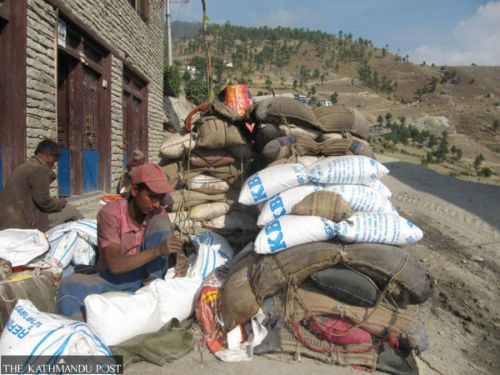
People in remote areas have to walk for days to buy subsidised salt from the nearest depot. Raj Bahadur Shahi/TKP
It was some 35 years ago when Harku Jung Budha of Patala in Kalikot district, for the first time, brought home enough salt to last his family a year. He had to make an 18-day journey to Haat bazaar in Chisapani, Kailali and trade some 18 kgs of ghee to bring the salt.
Budha still walks for five hours to reach Bakhre Bazaar in Thirpu to get around 25kg of salt, which will last his family for around three months.
“There is a Salt Trading Corporation depot in Patala but it's always out of salt,” said Budha. “Their stock only lasts for two to four days, then they close shop.”
A packet of iodised salt costs around Rs 9 at Manma, the district headquarters. However, the same salt costs Rs 25 in the depots of remote areas.
“It seems like we will always have to pay a high price for salt,” said Karne Budha of Patala-9.
People residing in the mountain districts of Karnali Province face shortages of salt every year. Contractors have been distributing salt on their own since the Salt Trading Corporation depots lack employees.
Of the four local units in Mugu district, the Salt Trading Corporation depots in Soru and Katyad rural municipalities are never open, local residents say.
Jagat Shahi, a local resident, said that contractors distribute salt as per their will.
“The contractors sell salt for two to three days and go back,” said Shahi. “We have to buy rock salt from the nearest Haat bazaar to fulfil the rest of our needs.”
Padam Bahadur Shahi, a resident of Soru Rural Municipality, said that those who can afford usually buy salt in bulk from the contractors, but those who can't have to eat their food without salt sometimes.
“Many villagers do not have the financial resources to buy salt brought by the contractors in bulk,” said Shahi.
Shahi said that the villagers face a shortage of salt every year, especially during the winter when transportation is disrupted by snowfall.
Villagers are forced to buy rock salt for Rs50 per kilogram during such times, according to Soru Rural Municipality Chairman Lok Bahadur Shahi.
“We had to face a salt crisis during last year’s winter,” said Shahi. “This year, the locals have stocked some salt in advance.”
The residents of the remote Mugum Karmarong Rural Municipality have to walk for five days to come to Gamgadhi, the district headquarters, to buy salt.
The rural municipality Chairman Tseringkyapne Lama said that after the Covid-19 pandemic, the villagers have been facing difficulties buying salt as the Chinese side has sealed off the border points.
“Earlier, the villagers used to get their salt from Tibet,” said Lama. “Since the Chinese side has sealed the border now, we have no other option but to reach Gamgadhi to buy salt.”
Lama said that in order to buy salt from the district headquarters, one has to spend around Rs5,000-7,000, that includes their travel, food and lodging expenses. “People residing further north have to pay Rs75 for a kilogram of salt,” said Lama.
The border closure by the Chinese side has hugely impacted the residents of Chittai, Dolphu, Karti, Kimri and Mugu villages as well. The villagers, who earlier used to buy their essentials from Tibet, have been forced to make their way to Gamgadhi to buy salt and rice.
“It takes us two days to walk to Gamgadhi and two days to return. We have to wait for a day to get salt and rice,” said Urgin Tamang of Mugu village. “We then have to carry all the goods on our back and bring them to our villages.”
Although ‘Bhanu Noon’, a packaged iodised salt that is provided by the government on a subsidised rate, costs Rs 9, people from high altitude settlements are forced to pay Rs 20 extra per kilogram in addition to the double profit margin set by the sellers, said Rashi Tshewang Tamang of Dolphu.
The government has allocated 1,500 tonnes of salt for Shreekot and 1,000 tonnes for Sorukot this year. The government bears the per kilogram transport charge of Rs 9 for Gamgadhi, Rs 14.50 for Sorukot and Rs 10.50 for Shreekot. However, the villagers cannot get their hands on the subsidised salt from the government, said Rup Bahadur Malla, a local civil society leader.
Meanwhile, a shortage of employees has hit the corporation and affected its operations, says chief of the Salt Trading Corporation in Mugu Khagendra Karki.
“There are only two employees at the office,” said Karki. “Due to a lack of employees, we are also facing difficulties stocking salt at the warehouse. If there were sufficient workers, the villagers would not have to face shortages of salt.”
In Humla, the Salt Trading Corporation has depots in Shrinagar, Sarkeghat, Simkot and Talbang. However, only the depot in Simkot, the district headquarter, has employees while other depots lack employees, and the contractors, in the presence of local representatives, distribute salt to the villagers.
The government transports salt by air at Rs 78 per kilogram to the district headquarters Simkot. The government bears the per kilogram transport cost of Rs16 for Yalbang, Rs 17 for Sarkeghat and Rs13 for Shrinagar as well. However, since the remote villages do not receive the government subsidised salt, the villagers are forced to buy rock salt for Rs50 per kilogram, said Rabindra Devkota of Sarkeghat.
“Even when the contractors bring salt, people with money and power get the salt first,” said Devkota.
The Salt Trading Corporation used to send subsidised salt to the residents of Namkha Rural Municipality through the Chinese border point in Hilsa. However, since the border closure, the residents have been facing difficulty in acquiring salt. It takes around five days on foot to reach Simkot from the rural municipality.
“We do not get subsidised salt in our village,” said Nutup Lama of Halji in the rural municipality. “We buy rock salt that is available in the local market at Rs150. However, since our village is not connected to the road network, even the availability of rock salt is not guaranteed.”
Manoj Chaudhary, chief at the regional office of Salt Trading Corporation in Nepalgunj, said that 600 quintals of salt were sent to Yalbang from Simkot through roadways in June-July. But for the residents of Namkha, it takes two days to reach Yalbang to buy salt.
Chaudhary said that there is a demand for around 32,000 quintals of salt in Karnali Province and the government provides transport subsidies for salt to all the province’s districts except Surkhet, Dailekh and Salyan.
In the mountain district of Dolpa, the Salt Trading Office is run by three employees. The government has set a transport subsidy of Rs13 per kilogram to take salt to Dunai, the district headquarters. There are two salt depots in the Dolpa headquarters–one each in Jufal and Dunai.
Last year, the corporation had planned to send 500 quintals of salt to each depot. However, only 100 quintals of salt have reached both depots till now. The other three depots in Sarmi, Kaigaun and Liku were allotted 200 quintals of salt each but they are yet to receive the product.
Babi Gurung, a local leader, said that despite the government providing over Rs2.5 million in subsidies in salt alone, people in the district continue facing shortages of salt.













